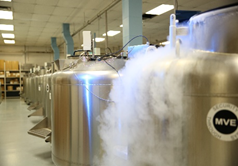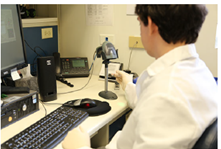CDC and ATSDR Specimen Packaging, Inventory, and Repository (CASPIR)
DLS operates the CDC and ATSDR Specimen Packaging, Inventory and Repository (CASPIR) located in Lawrenceville, Georgia. CASPIR was established as a centralized biorepository resource to preserve CDC’s valuable specimens and provide ongoing specimen management support to CDC programs. Specimens obtained through the work of CDC programs are critical to CDC’s laboratories, researchers, and collaborators.
In addition, DLS facilitates development and supports implementation of CDC’s specimen-related policies. The division works in partnership with CDC’s Specimen Policy Board and the CASPIR Advisory Committee to ensure CIO compliance with these policies. The repository operates in accordance with ISBER Best Practice guidelines as well as other current recommendations of biorepository science and cryobiology.
- Maintain more than 6.5 million specimens representing previous and ongoing studies, outbreak investigations, emergency responses, and public health surveillance.
- Provide reliable services to CDC laboratories, such as aliquoting, preservation, specimen retrieval, specimen package preparation, and specimen transport to and from the CDC campuses.
- Utilize a customized data management system for specimen inventory and tracking to faciliate retrieval and utilization.
- Provide a variety of printed labels and barcodes with required specimen identifiers (CSID/CUID) to uniquely identify all specimens within the agency and for specimen tracking.
- Assess the efficiency of operations through continual evaluation and innovation of our services and technical support as well as integrated energy saving solutions whenever possible.

Our Impact
- Specimens housed at CASPIR play crucial roles in public health research and population health. These specimens have the potential to advance our knowledge to characterize new etiologic agents, investigate causes of diseases, and develop new tests, vaccines, and treatments.
- Collections at CASPIR support and enhance national studies, such as the National Health and Nutrition Examination Survey, the Active Bacterial Core Surveillance Program, and the Child Health and Mortality Prevention Surveillance Network.

For more information, please contact CASPIR@cdc.gov.
- Page last reviewed: February 6, 2017
- Page last updated: February 6, 2017
- Content source:


 ShareCompartir
ShareCompartir